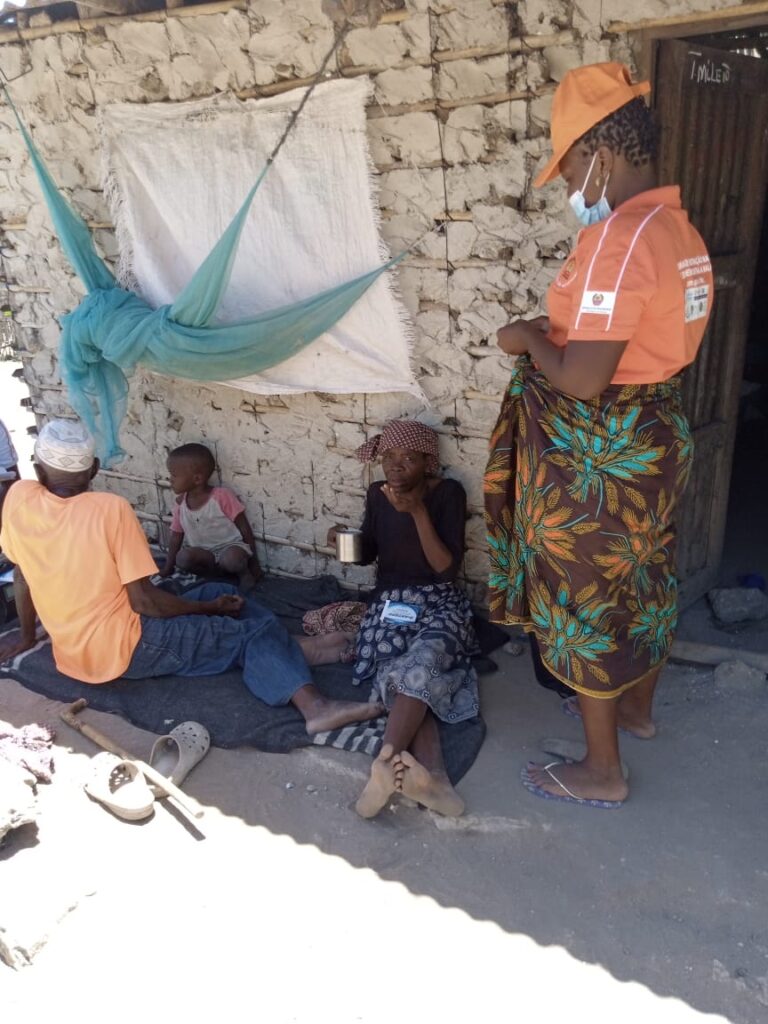For almost five years, families in northern Mozambique’s Cabo Delgado province have experienced ongoing violence from an armed insurgency. Cyclone Kenneth in 2019 and the COVID-19 pandemic only worsened an already complicated humanitarian emergency.
Entire villages and communities have been devastated and left without infrastructure, means of self-support, and health care services. To date, almost 800,000 people have been displaced from their homes, about half of which are children, according to the United Nations High Commissioner for Refugees (UNHCR).
In Cabo Delgado, malaria is a leading cause of death and illness and is also unfortunately quite common: In 2018, almost two out of every three children under age five tested positive for malaria.
Displaced families are particularly vulnerable to malaria-carrying mosquitoes because in fleeing their homes many had to leave behind their bed nets or lost them along the way. In refugee camps and local communities where they have moved, many live in tents or crowded into homes and do not have access to tools to protect them from mosquitoes.
To make matters worse,access to treatment is limited because a third of health facilities in Cabo Delgado are nonfunctional. The few facilities that are open are overwhelmed by the high influx of patients from the local community and the displaced families. With malaria, the key is early testing and treatment, within 24 hours of the start of fever, to avoid having the malaria progress to severe malaria. The lack of access to care is dangerous, especially for young children and pregnant women.
Because the displaced families are at risk for malaria, but it is challenging to prevent and treat it, the Government of Mozambique requested support for mass drug administration (MDA) of antimalarials. While infected mosquitoes spread the malaria parasite to humans, the mosquitoes first contract the parasite from infected humans. Giving medicine to everyone in a geographic area, even if they don’t show symptoms, helps to reduce the number of infected humans and protects them for up to six weeks, helping to stop the spread of malaria. The World Health Organization (WHO) recommends MDA for humanitarian emergency situations like the one in Cabo Delgado.
The U.S. President’s Malaria Initiative (PMI), which has partnered with Mozambique in the fight against malaria since 2007, supported the Mozambique Ministry of Health to plan these MDA efforts, including developing the strategy to reach the displaced populations. In addition, PMI and other partners helped refine the plan to ensure it was fully funded by the Global Fund to Fight AIDS, Tuberculosis and Malaria.

Health workers distribute antimalarial medicines to everyone in two districts to protect them from disease. Photos by Dr. Mercia Dimene, Mozambique’s National Malaria Control Program
Mozambique’s Ministry of Health malaria program worked with PMI, the Clinton Health Access Initiative, WHO and local partners to identify two MDA districts, Metuge and Ibo Island, that were home to more than 140,000 internally displaced Mozambicans. Additional technical support came from the U.S. Centers for Disease Control, which drew on experience in Haiti to develop a dashboard to actively monitor campaign progress, inform the timing and spacing of the drug administration, and then evaluate to assess coverage and impact.
During the rainy season, when families were most at risk for mosquito bites, health workers distributed medicines to everyone living in Metuge and Ibo, providing malaria treatment to up to 166,074 people and their communities in each of the three distribution rounds. All while following COVID-19 safety guidelines, 132 distribution teams, aided by community guides, went door-to-door as well as to schools, military camps, prisons, workplaces, health facilities, and markets. In addition, 265 mobilizers worked with village leaders, neighborhood leads and chiefs to make families aware of the benefits of MDA and how to receive it.
The distributions happened over up to two weeks in each of February, April, and May 2021, with each round reaching more and more people who voluntarily took the drug, increasing from 101,524 treated during the February distribution to 166,074 in the May distribution.
The campaign kept malaria cases from increasing despite conditions that could easily have led to high transmission, widespread illness, and death. Health facilities in Metuge and Ibo Island were also able to care for patients suffering from other diseases without the extra strain on the health system that was expected with the increase of so many vulnerable displaced people during the malaria season.
By responding to the government of Mozambique’s call for support, PMI and its partners helped ensure this large population of displaced people did not experience an increased threat of malaria illness and suffering on top of the many hardships they already face having fled their homes. Through foresight and action, Mozambique helped lower the malaria risk for the wider community while taking care of the most vulnerable in their midst.
